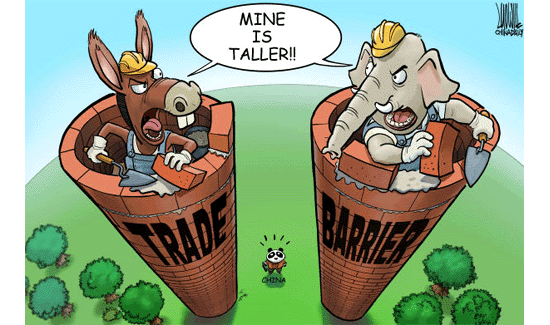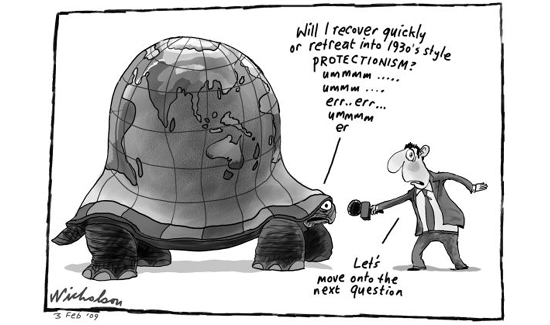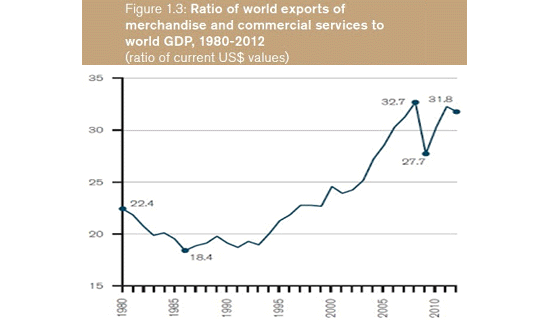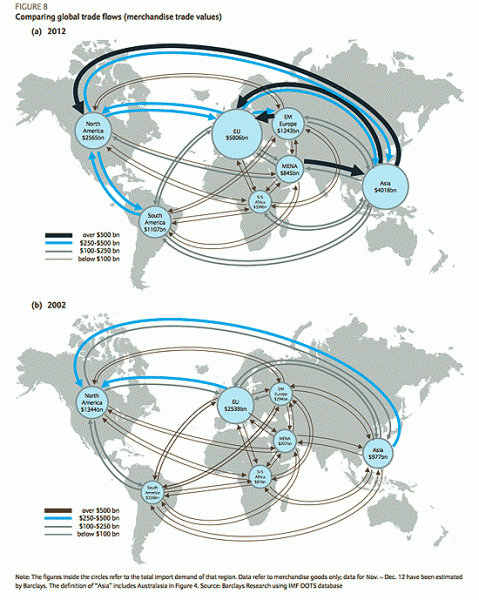
Today's Top 10 is a guest post from Matt Nolan.
Each Friday we'll have a Top 10 from a range of different contributors, kicking off with Matt today.
As always, we welcome your additions in the comments below or via email to david.chaston@interest.co.nz.
See all previous Top 10s here.
Sunday was the fifth anniversary of the failure of Lehman Brothers – the event that represents the period when 13 months of difficultly in financial markets transformed into the Global Financial Crisis, and ushered in the ‘Great Recession’.

1. Lessons of the Great Recession
Ryan Avent at the Economist neatly goes over a series of potential lessons from the Great Recession. Namely
· The importance of responsive monetary policy.
· The risk of unfettered capital flows without countervailing macroprudential rules.
· The scope for government action, and automatic stabilisers, in the face of a crisis.
· And my favourite – the importance of rules, norms, transparency, and evidence when making policy choice, both within and outside of a crisis.

2. Great Recession and trade
It is easy to talk about everything that has gone wrong since Lehman Brothers failed five years ago.
However, there is at least one place where the world as a whole made good choices, not just compared with the decisions made during the Great Depression, but compared with the type of behaviour many would expect during this type of crisis – it avoided the temptation for protectionism.
The Economist recently noted that here, pointing us to the following paper by the Chicago Fed.
"The number of anti-trade measures implemented by the United States was less than one tenth of what had been predicted at the beginning of the crisis.”

3. Credit availability a binding constraint
During 2008/09 global trade collapsed. The first indicator was the sharp drop in the Baltic Dry index (implying there was a sharp decline in demand for sea freight services), followed by reports that exporters where more heavily reliant on credit than other firms. This factor was fleshed out in this paper by the International Finance division of the US Federal Reserve.
“Even after controlling for demand, we find that financial conditions adversely affected sales during the crisis, and that the use of trade credit played an important role in the relative performance of firms. In particular, when financing conditions deteriorated, the more financially vulnerable firms turned to trade credit from suppliers as a supplement to other forms of credit. In addition, firms that were able to replace external credit with trade credit had better sales.”
All in all, this implies that credit availability was a binding constraint on exporters during the global financial crisis – a widespread view of what was going on at the time.

4. Probing the causes
Even so, whether this unprecedented collapse in global trade was due to movements in financial markets, or was instead solely due to how strongly global demand fell following the bankruptcy of Lehman Brothers is still an issue for debate. Writers from Boston College and Banque de France stated the following.
“To summarise, according to our investigation, there is no major ‘puzzle’ in the magnitude of the fall in world trade observed during the recent financial crisis. Trade fell mostly because demand crashed globally and did so particularly in its most import-intensive component – investment. Moreover, the strong relationship between exports and imports in each country, due to the increased internationalisation of production and the strong dependence of the tradable sector on imported inputs, contributed to the simultaneity and unprecedented severity of the trade collapse.”
In this way, links three and four both admit there was a sharp decline in global demand, and a significant pull back in investment – but they disagree about whether this was due to the access of finance, or the fact people just did not want to buy!
In truth, both factors will have been involved in driving this unprecedented decline – and it just goes to show how difficult it can be to split up potential causes when looking at economic data.

5. Avoiding protectionism at all costs
Given how far trade declined, there was a genuine fear – a panic even – among economists that this would lead to protectionism. This fear was not without basis – subsidies in Europe were being ramped up in early-2009, and were being justified on the basis of unique economic conditions.
Barry Eichengreen, an expert on the Great Depression, was vocal with his calls that protectionism needed to be avoided at all costs with reference to the pain it caused during the Great Depression (here and here).
While many aspects of the Great Depression continue to be debated, there is all-but-universal agreement that the adoption of restrictive trade policies was destructive and counterproductive and that similarly succumbing to protectionism in our current slump should be avoided at all cost
And with incredible foresight he saw that a lack of global co-ordination around this issue could be misconstrued as a trade-war – a view that led to the inappropriate calls to strike during a “currency war” in more recent years.
But if the details of the problem are different, the solution is the same. Now, as in the 1930s, countries need to coordinate their fiscal and monetary measures. If some do and some don’t, the trade policy consequences could again be most unfortunate.

6. Worst case scenario for global trade avoided
Coming back to the present, the World Trade Organisation recently released a report on global trade here. It is very long. Luckily Timothy Taylor summarises it neatly for all of us.
The bit I want to note is the fact world trade has rebounded, and is elevated:

We are in a world where we still want to trade with each other, and where the prior benefits of globalisation (diversity of products, affordability, etc) are still accepted. The worst case scenario for global trade has been avoided.

7. But what about going forward for external trade in New Zealand – shouldn’t we be worried about the hollowing out of manufacturing?
Trade and innovation are seen as an important part of the modern economy, and part of the way we co-ordinate as a society. Often the focus for potential types of trade and spillover effects is the manufacturing sector – but what about global services trade? This is what is asked here by some World Bank economists and an economist from the Kennedy school of government.
Overall, these findings provide some support in favour of the optimistic view of services as a potential source of growth dynamism. They also suggest that we need to improve our understanding of how firms in the services sector innovate and increase productivity, and of whether tailored policies can promote trade and innovation in services.

8. Services matter
While link seven was about Chile, the ideas feed in nicely to the direction the Productivity Commission have headed – with their recognition that services matter.
“It is time for a mental shift. We have a strong understanding of our primary and manufacturing industries, and reasonably solid data to work with in those sectors. We need a better understanding of the myriad ways that services add value to our economy, our employment and our incomes”
9. The weight around the neck of the New Zealand economy
The big issue for the Productivity Commission is productivity, and in this instance service sector productivity. Aaron Schiff from Covec and Eric Crampton from the University of Canterbury recently discussed this issue with relation to competition from imports. To quote Aaron:
He [ed Roger Procter here] also points to New Zealand’s low level of international trade, as trade is a good substitute for local competition, especially in a small economy. Again I agree, but while exports are often the focus of policies around trade, I reckon there should be plenty of emphasis on imports.
Imagine you are a NZ firm in the bottom half of the productivity distribution. You are surviving and comfortable, not facing much competition. If you started exporting (to Denmark, say), you’d likely face competition from considerably more productive firms based over there. Unless you were really motivated to improve your performance, you probably wouldn’t bother with exporting and just keep serving the domestic market where there’s little competition.
If low cost imports from productive foreign firms start coming in, maybe NZ firms will be forced to improve their game, or get killed off.
Essentially, within New Zealand we need firms, entrepreneurs, and households to focus on their comparative advantage – as I discussed earlier in the week. However, New Zealand’s small scale has always made effective competition difficult.
With services becoming more important, this issue has become the weight around the neck of the New Zealand economy in terms of its relative performance – and as a result, trying to ensure that services in New Zealand are exposed to global competition looks like it is increasingly important.

10. The growing importance of trade in services
It turns out we can extend the ideas in link nine even further.
What happens if we are heading into a global world where different goods and services are “scarce”. Via Marginal Revolution comes the following discussion about the “end of stuff” on Nemo’s blog:
As the economy moves to cheap, scalable hardware production and the only things that are scarce are good ideas (technology, design) and human attention (clicks, impressions, brands) the whole mindset of growth driven capitalism in Asia is going to be in for a profoundly rude awakening. All those rentier assets will not be worth much anymore and the ability of the state or a couple of tycoons to control the commanding heights of an economy will be profoundly impaired by the lack of commanding heights more than anything else.
We are moving into a world where trade in services is becoming more important, more valuable, and where it is removing the burden of distance from New Zealand firms. The fact the world is changing, and that New Zealand firms and households have to be prepared to change with it, is an important point to keep in mind – both in terms of what we can expect, and what policies government should be putting in place.

--------------------------------------------------
* Matt Nolan is an economist at Infometrics, and an author at the blog TVHE. He specialises in looking at the household sector, and household economic data, but will offer an opinion on pretty much anything related to business and the social sciences.
29 Comments
This whole piece focuses on trade and a recent article from a different source has caused me to reconsider my opinion of it. I happily admit my education here is lacking so am interested in what others have to say.
The article that caused me to think queried Free Trade. My position (for now) is that any business operating within a society has a social obligation (a contract if you will). This means they provide jobs, they have an obligation to pay a fair wage to enable their employees to survive, and perhaps even purchase the goods they provide, to pay taxes to support the infrastructure that enables them to distribute and sell their goods and services, and the social infrastructure such as education and medical and so on that they also benefit from, price fairly based on the cost of manufacturing and distributing the product or service, ensuring they are affordable and so on. Parts of this will be market driven, for example a market will not accept a product which is over priced (unless it is a crucial one supplied by a monopoly). Government will also play a role, but what place does import and export play. Multi-national conglomerates today demonstrate very little national loyalty, structuring their businesses to minimise or eliminate any tax exposure. Thus they get rich without meeting any of their social obligation to society (and lets not forget they are a societal phenomenon that requires society to survive) Imported goods do not support jobs with all the flow on effects. Free trade eliminates tariffs which would compensate to some degree, and also enable local manufacturing to develop and become competitive.
I guess the question in light of the articles provided here is what is the right model for the future of our world. Does free trade support ordinary people or does controlled trade work? Do our politicians understand the issue. Economists seem to be prejudiced, but a small number seem to be questioning what is happening.
@No 9 MAKES MY BLOOD BOIL
We complain about the high cost of building a house , but when we do get price competitive products entering the local market , we cry foul.
Fletcher group sought a got protection from imported GIB Board , supposedly due to "quality" issues .
The truth was the Gib in question came from Thailand BUT was made by UK firm Gypsum in thier Thai pant .
There never were or are any quality issues with the UK product, or the Thai product , its was the orginal GIB ever made.
Go Figure
All to simplistic.
If country A trades with country B such that for every $1 A sells to B it buys $5 back from B this is unsustainable. OK this to is too simplistic so looking on a global scale.
For every $1 counrty A sells to the world it buys $3 that to is unsustainable.
For global trade to work for all countries then it must have a zero sum. That is they must all have total sell = total buy.
If we have a global market where all countries have total sell = total buy. Then why not just import the products, services and materials you require and boost local competition.
As an added bonus we would not need to ship all sorts of products around the world that could be produced locally and so save the planet.
We allready have global services in terms labour. When the likes of Telecom wish to appoint a CEO they look globally but does it bring down the high sallary - NO
All these ideas are great so long as they upset someone else.
That sort of pinko thinking won't get you anywhere.
Sorry Mike, that one was intended for Murray86 at the top of the thread.
Matt,
Excellent 10 thoughts. The Economist's reflections on the Great Recession in number 1 reassuringly to me reinforce all the key messages that I have tried to articulate over the last year or two here. Am very happy to concede they do a better job of the articulation:
The issue was entirely fixable (albeit with clear moral hazard) with monetary policy. Inflation in some countries may be the least bad solution out of the problem.
Unfettered capital flows were both a key cause (and ongoing even worse consequence) of the recession. Those dong the least fettering (like NZ) are likely to be the biggest long term losers.
Governments had plenty of options to expand activity, and deep asuterity was the worst response. As tragic as they were, the Christchurch earthquakes were very convenient for NZ, as it is difficult to imagine Bill English being bold enough or having the imagination to have acted without them.
Happy to allow you the transparency and accountability point, as clearly you are trying hard to explain economic concepts to those Kiwis willing to read a few of your articlaes.
Cheers
How reassuring that the Economist magazine publishes an article which acknowledges the role that the financial sector plays in precipitating financial panics and economic criises, lol.
These so-called lessons, aren't exactly knew. They've been known for years, basically since the Great Depression, a crisis which shaped the regulatory regimes in countries around the world until neo-liberals hijacked the policy process in the late 1970s and facilitated the deregulation of the financial industry in the 1980s.
You can't have a liberalized financial system and a stable economy. Its just not possible. Arguments that you can have a lightly regulated regime with so-called macro-prudential controls, which guaratee economic stability are just spurious You have the the cake and eat it too. It was macro-prudential controls like the Basel Accord which significantly contributed to the crisis in the first place. The powers that be knew the risks all along, but they just didn't care, because they'd been captured by the very industry which they were supposed to regulate. And anyone who believes that the banksters and the idiots who enabled them have been humbled and lost any of their power due to the damage they've wrought due to the Global Financial Crisis, they need to get a clue.
http://www.globaleconomicgovernance.org/wp-content/uploads/GEG-Working-paper-Ranjit-Lall.pdf
http://www.rbnz.govt.nz/research_and_publications/speeches/2001/0104984.html
http://michael-hudson.com/2013/07/the-bubble-economy-as-a-2-part-play-for-privatisation/
The dogmatic hubris inherent in the current RBNZ chairman's linked speech is astonishing given the fact rating agencies claim NZ banks lend at least 140% of local deposits.
The implication being the creditors of loans above the local deposit base are foreign wholesale lenders engaged in collateralised borrowing via currency swaps and thus exempt from the demands of OBR prepositioning.
If banks operate in widely diverse international markets, if significant numbers of depositors are expected to bear losses and are treated pari passu, there is reason to hope that the privately optimal level of bank capital globally will converge to the socially optimal level. In such a world, shareholders bear expected losses while bank creditors bear unexpected losses. In such a world, the role of the regulator is to protect taxpayers, current and future, from being exploited by bank shareholders and depositors.
"In such a world, the role of the regulator is to protect taxpayers, current and future, from being exploited by bank shareholders and depositors."
Personally I think its exactly what its there to do...avoid moral hazard and blackmail that the tax payers pay for.
Its simple its your money on deposit its your choice to put it there, or not, your profit, your loss.
regards.
My point is the depositors along with other unsecured creditors are not pari passu with derivative protected creditors and the then deputy governor could not have been unaware of the fact.
Thus, it is the regulators job to make these factors a matter of public record so depositors are no longer asymmetrically denied knowledge of the extent foreign wholesale borrowing places their funding at risk without commensurate reward and collateral protection.
Since when is it the RB's job to point out every risk to an investor? Did the RB point out that getting 1% more off a finance company than a bank deposit was actually grossly under compensating for the risk?
Surely its the "duty" of someone investing to make every effort themselves to understand the risks?
To me its the regulator's job to make sure no relevant information is hidden, and is easy to understand as far as practical and not to point out certain or all risks.....
Now if that knowledge isnt easily available then yes thats a failure...but if ppl dont go looking.....the tax payer should not be bailing them out if it goes wrong.
Though reality is even with the OBR I suspect there will be some bailing....because I dont see just one going, its a monlithic risk profile....they all will be darn close to going.
A good term btw,
Pari passu is a Latin phrase that literally means "with an equal step" or "on equal footing." It is sometimes translated as "ranking equally".
In Carr's own words.
In such a world, the role of the regulator is to protect taxpayers, current and future, from being exploited by bank shareholders and depositors.
When was the RBNZ mandated to undertake such ideological endeavours? Nearly every taxpayer is probably a bank depositor - which identity of the citizen are they empowered to save against the other?
steven,
Actually depositors aren't on equal footing with bondholders, because at the core of the Open Bank Resolution policy, depositors are deemed to be unsecured creditors of the bank whilst bondholders have a priviledged position in liquidation proceedings. This premise is at the heart of global banking reforms.
"Spain, Canada, and New Zealand have already adopted specific measures using the ‘bail-in’ approach to guarantee the solvency of the ‘too big to fail and too big to jail’ banksters using depositor money. For simplicity’s sake, a bail-in is pretty much the opposite of a bailout. In a bailout, which we all know far too well, everyone shoulders the losses of the offensive, insolvent institution. Think of TARP. However, that ‘socialization’ of losses tends to annoy folks; especially those who had no prior pecuniary interest in the aforementioned offensive institution. And yes, I do mean offensive...However, in a bail-in, instead of getting the funds from the general public, the strategy is to swipe (not write-down, not give a haircut, etc.) depositor assets. This is done by a bit of wordsmithing. Under previous customary definitions, depositor assets were also known as the bank’s liabilities. Obviously an insolvent bank has more liabilities than assets (in simple terms) and as such changing the status of account holders from ‘depositors’ to ‘unsecured creditors’ means the bank can ‘repatriate’ your money to pay off its bad debts."
http://www.marketoracle.co.uk/Article39923.html
The implications are even more dire than the author speculates. A little while ago I followed a link posted by Andrewj which discussed the new bank failure regimes which are being implemented around the world, which our Reserve Banks's OBR is derived from. In it the author, Ellen Brown, reveals provisions within the U.S. governments legislation which gives precedence for investment banks derivatives deals over depositors who I revealed above, are now deemed to be unsecured creditors.
"Safe harbor status grants the privilege of being excluded from mandatory stay, and basically all other restrictions. Safe harbor lenders, which at present include repos and derivative margins, can immediately repossess and resell pledged collateral.
This gives repos and derivatives extraordinary super-priority over all other claims, including tax and wage claims, deposits, real secured credit and insurance claims.Critically, it ensures immediacy (liquidity) for their holders. Unfortunately, it does so by undermining orderly liquidation."
I was curious to see whether derivates were covered in the OBR scheme, but according to the New Zealand Banking Association the Reserve Bank has yet to clarify this.
"Derivatives: The process of applying the haircut to derivatives still remains to be clarified. NZBA understands that the RBNZ will set up a small group workshop to consider this issue." http://www.nzba.org.nz/assets/Uploads/111004-OBR-Submission-NZBA.pdf According to another article which I've found, Australian banks are lobbying the Australian government to incorporate provisions in their legislation which protect bank's derivative positions in case of a crisis. I would bet that the same is happening in New Zealand behind closed doors. Do you think John Key, Bill English, and Graeme Wheeler are likely to oblige?
"In the Australian Financial Markets Association (AFMA) 11 January 2013 letterin reply to the Australian Treasury’s September 2012 consultation paper,“Strengthening APRA’s Crisis Management Powers,” we see clearly that our banks consider the issue of how derivatives would be handled in a bank bail-in to be “critical”:
Legal certainty around the enforceability of the netting and collateralarrangements in connection with OTC derivatives is critical to the stability of the market."
http://barnabyisright.com/2013/08/08/australian-banks-demand-protection-from-derivatives-losses-under-bailin-plan/Im not aware I said,
"Actually depositors aren't on equal footing with bondholders, because at the core of the Open Bank Resolution policy, depositors are deemed to be unsecured creditors of the bank whilst bondholders have a priviledged position in liquidation proceedings. This premise is at the heart of global banking reforms."
Clearly this isnt the case. Though the interesting thing with an OBR event is a depositor with no waiting period can remove money quickly, whereas a secured creditor cannot.
BTW, when I say bonds I mean "real" bonds, ie Govn ones and not corporate bonds which I regards as junk....I'd never buy a corporate/company bond.
regards
I agree with the OBR, the depositor had money there to make a profit and is free to make a contract, or not. The tax payer on the other hand is an "innocent party" being expect to take on the mis-calculation of others.
"offensive institution." indeed, personally I think bankers should be in and go to jail for this.
regards
Foreign wholesale lenders have money calculated @ 40 % of retail depositor's there to make a profit, but due to the exigencies of collateralised/hedged lending their credits are exempt from OBR haircuts in the event of a local bank insolvency. I doubt the fine print makes it clear NZ depositors along with other unsecured NZ creditors will be exclusively called upon to re-captalise their bank in the event of an insolvency event.
The RBNZ permits our banks to continue to lend 140% of retail deposits with thin capital retention rules ( ie12% of assets? at max) There is no room for error in such a situation and the rating agencies repeatedly say so.
Others are not so kind:
Here's the encyclical as presented to the House of Commons
Loan-deposit ratio above 100% is like (untreated) AIDS. As it progresses it weakens the immune system of economy that safeguards against adverse events: natural disasters, wars, etc or sometimes unpredictable mood swings of market players. The current crisis was triggered by the collapse of subprime mortgage market (effectively overvaluation of assets). This time the system, for years having had been weakened by loan-deposit ratio above 100%, also collapsed altogether. It was a giant pyramid and it was bound to crumble anyway (for whatever direct cause). It was like a human suffering from AIDS whose death was not caused by AIDS directly, but by pneumonia, flu, infection, etc. However it is AIDS that made the curable illnesses lethal.
Until recently the world enjoyed a sustained period of high growth and low inflation and the fact that it came to such an abrupt end does not come as a surprise. It was in the very nature of the pyramid scheme mechanism. The deposit creation process with a ratio above 100% guaranteed impressive-looking economic growth figures. At the same time there were no extra cash hitting Main Street, as there was no extra cash printed. In this context, the high growth of property prices is no surprise. In their huge majority and extent, these are, in practice, cashless interbank transactions. The world stayed oblivious in this economic miracle like customers of a pyramid scheme being happy with the figures on their statements until they wanted to withdraw money. But like with any pyramid scheme, the financial system ran out of cash, with the outcome of a lack of liquidity, not high inflation.
I still maintain that really its up to the investor to make an informed decision. If the investor isnt up to that dont invest or get professional advice before doing so. I mean its almost like operating on yourself with a knife and fork for a hernia cause you got a pain lower down and the Internet says so. I mean dont ppl go to GPs?
In terms of loans to deposits, there is leverage and it seems reasonable for there to be some leverage. The problem is just how much, certainly it seems excessive these days...ie a small drop in the housing market sends bank bankrupt/insolvent. Now in the USA it seems far higher than here....We have 12%? whats the US even less than 1/2 that? EU?
Greg Pytel? I mean who? Is leverage bad or is it the growth caused by the changee and rate of change of leverage?
"The world stayed oblivious" really? I think some, a few yes were pointing out it didnt look very good. Were others really oblivious or was it their political blinkers or big profits they were making? Further, more than a few more have been pointing out for years that the main under-pinning of the ponzi scheme, cheap fossil fuels was ending....
I find it interesting now things are going to custard just how many are whinning no one saw it and no one told them....that simply isnt true, ppl were saying, just fell on deaf ears.
regards
Steven - If you think people have money in the bank to make a profit then you are mistaken. There is hardly a profit to be made on the paltry amount of interest that is paid by the time withholding tax is deducted and inflation is accounted for.
The taxpayer is hardly an innocent party in all this as everyone over 18 has the right to vote and for 9 years people voted for Labour and it's coalition who did nothing but ensure the prices of housing went up in value and that is what has caused the banking issues.
Go test your theory on depositors being in a position to go down to their local banks and write a contract getting the bank to guarantee your savings....please let me know how you get on.
The RBNZ's OBR is simply using other people's money to bail out something the RBNZ could not control nor had the brains to control. The more you regulate the more cunning those who are being regulated become. The more cunning those being regulated become the more bizzarre the behaviour of the regulators until you end up without morals and ethics. If people or business don't have the ability to pay then they are being dishonest and that dishonesty should carry a very heavy and harsh penalty. In fact all dishonest people should be marched into a town square and paraded around and humiliated for days. The lack of morals and ethics needs addressing.
If we raise children to take what they like off others what do we get? Lots of examples running around in NZ with their hands on the compulsory contributions to the public purse wouldn't you say!
If you raise children to get what they want by their own honest effort then you pretty much get honest capitalists.
Ppl put money in as a deposit and get what they get, its a profit even if small. If its too small put it somewhere else more productive at I would assume greater risk, that is an investors decision.
Sure labour let house prices rise and I critise them for it, but really would Natioanl have been different? you know let the ppl decide what to do....I find it strange you dont like regualtion and Govn interferring yet when they dont and a bubble forms you critise them for allowing it....
The tax payer is inocent in terms of the investors choice, or in other words we have moral hazard....
I dont fathom by what you mean by my theory, my comment is simple if you dont like the returns and risk take your money elsewhere.
The OBR simply stops a de-facto passing on of the costs to the tax payer, depositors have always been at risk....just the Govn guaranteeing their money has been implicit...now its explicitly not.
children & honest capitalists etc now you are drifting off into make believe land IMHO...
regards
Steven - I don't think your getting it. Investors have to look after themselves and I'm all for that. I bet many people have formulated plans for an OBR event. I for one am sick of having to take action because a bureacrat enforces me to. Having to keep one eye on the market and business and one eye on the Govt, Bureaucrat and all the Cronies becomes tiresome.
If you find it strange that I don't like regulation and Govt interference then you had better try and understand the reasons why. Just to clarify I have never said I think the market is in a bubble either. I have commented that it seems rediculous that people hang a noose around their necks for years paying off a mortgage.
House prices need to be afforable and I strongly believe that there are a number of distortions that have affected the supply side. There could well be issues that aren't measured on the demand side.
If you have afforable housing everyone has a better standard of living. Who the heck wants to live in some damp, mouldy, cluttered house for years not having a enough money to do anything about it? If people have some financial freedom they can spend their money on a better standard of living and that better standard of living flows through the economy into other sectors. They are also so less likely to require Govt handouts. If we have less Govt handouts then we can downsize Govt and bureaucrats.
If people can be self-sustainable then we are all better off. So the taxpayer is not all innocent, as they like large Govt and Bureaucracy who tend to make stupid decisions that screw up the fundamentals of a good economy. Take the Greens and Labour...what policies have they ever implented that allows individuals to be self-sustaining? They both flout the word sustainable around but are really only ensuring a position that takes care of themselves first. You know the "we can sustainably sit in Parliament for ever if we implement these policies" attitude. Supporters of these clowns are nothing more than gullible and naive. Nats not much better either mind you it's just the pocket they pee in that is different.
The end of scarcity. #10. Really? Try telling that to many NZers trying for decent housing-and for some -food.
I agree with you there regarding housing and food.
But some things are already post-scarcity. See this slightly crude article for a good overview (http://www.cracked.com/article_18817_5-reasons-future-will-be-ruled-by-…).
Well no JetLiner. Some things have always been plentiful I would think. Porn now. But in hunter gather societys 10,000 years ago there would have been abundant firewood and clean water. No competition for resources meant people could simply choose the best sites at will.
I don't really see the difference between scarcity and poverty and i see lots of poverty. A significant proportion of people in New Zealand cannot afford to buy the things I can. eg. A decent daily coffee in an excellent venue. When I leave Auckalnd airport i see masses of poorly maintained unhealthy deteriorating house.
There is scaricity of every item to decently house those people.
Existing health technologies these people need can't be made available to them, or for that matter almost any New Zealander.
The miserable few items people living in those houses can afford to buy are made by even lower income people in foreign countries.
The end of scarcity does show up many places I can see,
KH,
The state of affairs isn't due to material scarcity but due to a lack of purchasing power to access the material abundance.
I pin the blame on the fundamentally anti-labour world view that infects our governing institutions and even the media. I think its likely a product of the crisis in labour relations during the 1970s. The baby boomers are so fixated on what happened during that time when the rising cost of living provoked militant industrial action. They'rve become obsessed with ensuring it never happens again that they don't realise that the world has fundamentally changed. I think its this fixation that informs the Reserve Bank of New Zealand's inflation targeting policy which I refer to in comments above.
Labour reforms under the Employment Contracts Act and Employment Relations Act, have undermined the bargaining power of labour, whilst various governments have deliberately pursued a policy of bringing about a post-industrial society.
Manufacturing is particularly vulnerable to hikes in the OCR and interest rate rises, because they're industries which are most exposed to global competition. They can't absorb further costs cutting into their already slim margins, especially since interest rate hikes are inevitably followed by economic downturns which reduce orders of their products.
We also have an economic regime that all but guarantees asset price inflation, whether its Reserve Bank reserve asset ratio weighting which has a pro-housing bias, taxation policy, and easy access to cheap credit from overseas.
This country is fundamentally in need of a public discussion about the issue.
I basically agree with you Anarkist on the part about the reduction of labour power. Notably in the 1970s and indicator was that departments of 'Human 'Relations' became 'Human 'Resources' and the huge shift in power that illustrated.
And it reminds me of the discussion about the 'hollowing out' of the middle class we see here on interest.co. Or maybe it's the elimination of the middle class.
With that it seems not just to be a problem that "labour' has. It's been well extended into the middle classes and smaller business. eg. People who I would regard as high income are just screwed if they live in Auckland and have to pay more than seven figures for a house.
But back at the scarcity level. A lot of the writing does not even seem to be aware of the services and goods that are needed to keep them alive. it's almost of the view that 3D printers will solve all problems. Without noticing that all the people who build the roads, sewers and the thousands of roles that are similar. That lack of awareness bugs me.
KH,
I know what you're saying, but all those issues aren't REAL scarcities, but ENGINEERED scarcities.
It may not sit well with people but we're fundamentally ruled by people who are enarmoured with the dogma predicated with ensuring scarcity for the majority of the populace.
This elite first rose to prominence in the 1970s and openly voiced their agenda.
“that some people will obviously have to do with less…It will be a bitter pill for many Americans to swallow the idea of doing with less so that big business can have more.” But so be it.
BusinessWeek, October 1974
http://billmoyers.com/2010/10/06/40th-anniversary-of-common-cause-october-6-2010/
. "One must face up to the bitter truth that only so long as the economy is de- pressed are we likely to be free of inflation" (Samuelson, 1970). "No one
in the world has a recipe for correcting our price performance without some unfortunate increase in unemployment. . . . [the public] should be told the facts of life" (Arthur Okun, 1970). This is not bread, but a stone. Conservatives are not offering more. ". . . there is no other way to stop inflation. There has to be some unemployment. . . . It is a fact of life" (Milton Friedman, 1970).6 "The election will show whether the American people are mature enough to accept a sustainable (low) level of activity" (Henry Wallich, 1970). ". . . this economy can no longer stand a real boom with low levels of unemployment without kicking off a rampant in- flationary spiral" (Alan Greenspan, 1972).8 http://www.masongaffney.org/publications/i1full_employment_limited_land_&_capital.cv.pdf Our media and our educational establishment have failed in their duty to subject these claims to proper scrutiny and have just swallowed it unquestioningly.. High housing costs like I've pointed out are engineered too, by constraining the supply of land that can be developed, skewing economic behaviour through taxation and bank asset ratios etc. Its all our fault. We've failed to engange in the political process and in holding our leaders to account, whether its babyboomers, Generation X, or Millenials. We're all complicit.Reward and motivation is not what the economists thought.
KH,
Actually KH humanity have become sufficiently productive to fulfill the goal of the end of scarcity probably since at least the 1920s. In fact it was a big concern of American industry leaders and policy makers that the United States was so productive that industrial production would outstrip demand and thereby reduce the time workers needed to dedicate to labour.
"In a 1927 interview with the magazine Nation’s Business, Secretary of Labor James J. Davis provided some numbers to illustrate a problem that the New York Times called “need saturation.” Davis noted that “the textile mills of this country can produce all the cloth needed in six months’ operation each year” and that 14 percent of the American shoe factories could produce a year’s supply of footwear. The magazine went on to suggest, “It may be that the world’s needs ultimately will be produced by three days’ work a week.”
Business leaders were only too aware of the potential political implications of a populace with sufficient leisure, who weren't fully occupied with earning enough income for day to day living. They would likely want greater participation in the political process and challenge the wealthy's control.
John E. Edgerton, president of the National Association of Manufacturers, typified their response when he declared: “I am for everything that will make work happier but against everything that will further subordinate its importance. The emphasis should be put on work—more work and better work.” “Nothing,” he claimed, “breeds radicalism more than unhappiness unless it is leisure.”
http://www.orionmagazine.org/index.php/articles/article/2962
Many would be aware of Karl Marx's accusation that the capitalist economy has an inbuilt tendency to overproduce their goods, flood the market, which results in a diminishing rate of profit and eventual economic crash. Few would know that it was a concern of classical economics Jean Charles de Sismodi and none other than Robert Malthus. In fact Robert Malthus advocated that unproductive classes should increase their consumption in order to absorb the goods which the working classes couldn't afford to buy, because of the unfair distribution of income.
I'd argue that this overproduction was one of the chief causes of the Great Depression, because workers were encouraged not to consume but instead invest their incomes in the capital markets, which only increased industrial capacity and the tendency of the economy to overproduce. Few would know that the Roosevelt New Deal was actually orchestrated by industrial magnates, who wish to control what was in their view "destructive" competition, prevent industrial overproduction, and maintain stable prices and therefore guarantee profitiability.
"In his book “Successful Living in This Machine Age” (1932), Filene argued that the drive for lower wages and the privileging of investment over consumption had produced chronic overcapacity: “At a time when more buying was the need of the hour, [capitalists] were still calling upon the masses to refrain from buying goods, and to invest their savings in more production; and when industries languished from want of customers, they advised reducing wages, a process which must result in a further falling off of sales.” As in the stock bubbles of the 1990s and 2000s, financial experts in the 1920s urged ordinary Americans to emulate the rich by gambling in stocks. According to Filene, financial experts recommended that ordinary people “should better themselves by investing their savings and drawing either interest or dividends, instead of having to depend forever upon the wages which they might receive from week to week.”
http://www.salon.com/2010/10/05/lind_america_plutonomy/
After the abandonment of the rigidly controlled economy that followed in the wake of the Oil Crisis in the 1970s, focus shifted towards enabling the FIRE sector of the economy to absorb the excessive revenue generated by corporate profits. The excessive returns are larguely due to the maldistribution of income in Western post-industrial economies, the oil producing countries of the Middle East, and the export oriented manufacturing powerhouses of South East Asia. Policy makers were able to take advantage of the liberalization of the banking sector, which took place in the late 1970s which were driven by demands for higher profits by the multinational investment banks in the United Kingdom and the United States.
Another strategy, which they employed was the creation of make work type jobs that didn't exist prior to the 1980s and produce very little that is actually meaningful.
http://www.strikemag.org/bullshit-jobs/
When all else fails, they all but ensure the occurance of periodic economic crashes. Nothing like an economic crisis to destroy productive overcapacity.
He seemed to know what was slowly panning out. In fact, the year before Paul Volcker delivered the Fred Hirsch Memorial Lecture at Warwich University in England entitled ‘The Political Economy of the Dollar’. He stated:
"A controlled disintegration in the world economy is a legitimate object for the 1980s."[16]
What did he mean by that? Almost a year later the world economy did start to go into freefall when Mr Volcker, starting the week of Oct. 6-12, 1979, "began raising interest rates, by raising the federal funds rate and increasing certain categories of reserve requirements for commercial banks. He kept pushing rates upward, until, by December 1980, the prime lending rate of U.S. commercial banks reached 21.5%."[17]
http://econospeak.blogspot.co.nz/2011/08/crisis-of-global-economy-was-it-planned.html
Matt Taibbi fact checks the Forbes Randian devotional piece from earlier in the week, summarising why Goldman Sachs is not more worthy than Mother Teresa (to be honest, when I read the Forbes article earlier in the week I thought it was parody)

We welcome your comments below. If you are not already registered, please register to comment
Remember we welcome robust, respectful and insightful debate. We don't welcome abusive or defamatory comments and will de-register those repeatedly making such comments. Our current comment policy is here.